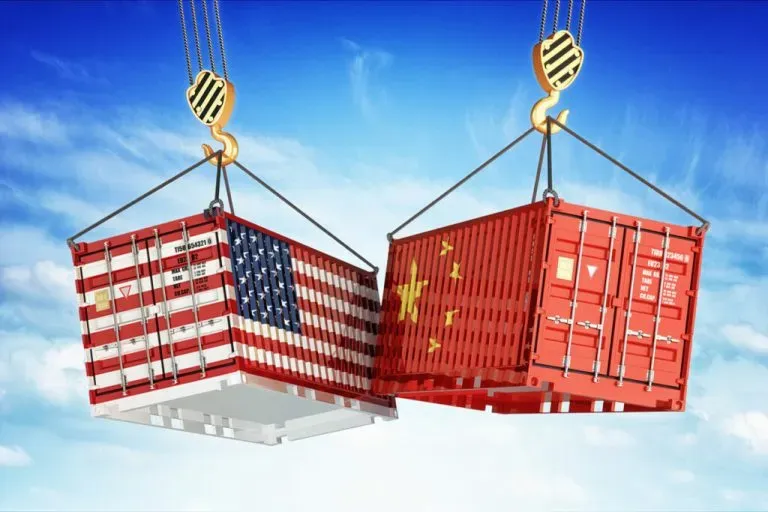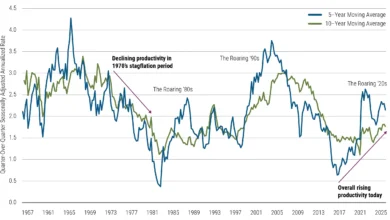U.S.-China Trade Tariffs: Impacts on Economy and Jobs

U.S.-China trade tariffs have dramatically reshaped the economic landscape, sending ripples of uncertainty through global markets. Since the Trump administration’s implementation of these significant tariffs, the stakes have never been higher, with tensions escalating as China retaliated with their own crushing tariffs. The implications of this trade war are profound, heavily influencing stock market dynamics and raising fears of a potential economic downturn. Investors are particularly concerned about the long-term impact on jobs, as various industries grapple with shifting regulations and market responses. As we delve deeper into the effects of these tariffs, it becomes clear that the ramifications extend far beyond the immediate fiscal losses.
The escalating trade conflict between the United States and China has raised critical questions about international trade relations and economic stability. This ongoing situation can be viewed as a clash of tariffs that not only influences market performance but also impacts employment levels and industry forecasts. As businesses reevaluate their strategies amidst these new challenges, potential repercussions loom large, including concerns over a stock market downturn and job insecurity. The intricate web of trade negotiations and retaliatory measures highlights the urgency for both countries to find common ground. With the future of countless industries at stake, understanding the broader consequences of these tariffs becomes crucial.
Understanding U.S.-China Trade Tariffs
U.S.-China trade tariffs have become a defining issue in contemporary economic discourse, particularly since the Trump administration enacted sweeping measures intended to protect American industries from foreign competition. These tariffs impose additional costs on imported goods, which ostensibly aim to bolster domestic manufacturing and alleviate trade imbalances. However, the implementation of these tariffs has also raised a multitude of questions regarding their long-term effectiveness and potential fallout in both the U.S. and China.
As we delve into the complexities of these tariffs, it is essential to understand the immediate repercussions they have on bilateral trade relations. When the U.S. introduced hefty tariffs on Chinese imports, it sparked an aggressive response from China, leading to a tit-for-tat escalation. This resulted in heightened tensions and a damaging trade war that has affected not only economic metrics but also investor sentiment. The dynamics of U.S.-China relations continue to adapt, and it is critical to analyze how these tariffs affect global supply chains and international markets.
The Implications of Trade War on U.S. Economy
The potential for an extended trade war looms heavily over the U.S. economy, raising the specter of an economic downturn that could reverberate across various sectors. As tariffs escalate, businesses are increasingly concerned about rising costs and the potential for reduced sales. Industries reliant on imported materials are already feeling the pressure, as these tariffs result in elevated prices that can lead to decreased consumer demand. The implications are striking; if companies are forced to pass on costs to consumers, we could witness reduced spending that negatively impacts economic growth.
Moreover, the trade war sparked by these tariffs could directly impact employment rates. Job losses in sectors sensitive to trade policies—such as agriculture, manufacturing, and retail—are already being reported. Analysts estimate that tariffs could jeopardize hundreds of thousands of American jobs, particularly in industries that rely heavily on exports. As companies cut back or shelve expansion plans, the cascading effects on job creation and economic stability become a pressing concern for lawmakers and citizens alike.
**Tariffs and the Stock Market Crash**
The stock market has shown unprecedented volatility in response to the trade tariffs defined by the Trump administration. Following the announcement of heavy tariffs, investors were quick to react, resulting in a staggering drop in stock values and substantial losses amounting to billions. This level of market turmoil echoes similar patterns experienced during previous economic crises, highlighting the interconnectedness of tariffs and financial stability. As hedge funds and institutional investors confront sweeping margin calls, the specter of a stock market crash becomes a tangible threat that market analysts cannot ignore.
As fear and uncertainty ripple through financial sectors, understanding the role of tariffs in triggering such market behavior is critical. Investors are increasingly cautious about the impact of long-term tariffs on corporate profitability and economic growth. In situations where tariffs are expected to linger, markets may remain in flux, creating an environment ripe for further declines. The correlation between tariffs and stock market performance raises pivotal questions regarding investment strategies and market confidence, underscoring the critical need for consensus on trade policies moving forward.
Economic Downturn and Job Impact from Tariffs
The current economic climate is under significant pressure following the imposition of tariffs, prompting concerns about a potential downturn. Economists warn that a sustained economic downturn could have catastrophic implications for the labor market. As businesses face increased operational costs due to tariffs, many are likely to invoke layoffs or freeze hiring—resulting in an uptick in unemployment rates. Industries that were already struggling pre-tariff implementation may find it nearly impossible to sustain their workforce amid rising expenses, leading to a further contraction in economic activity.
Job impacts from these tariffs extend beyond immediate layoffs; they also influence future employment opportunities and wage growth. With many companies reluctant to expand their enterprises under the shadow of uncertainty, new job creation may stagnate, further exacerbating the economic struggle for American workers. For communities reliant on industries heavily affected by tariffs—like breweries and manufacturers—the stakes are especially high, as they face not just market volatility but also the adverse impacts on livelihoods, economic health, and local economies.
Political Ramifications of Tariff Policies
The political landscape is also reshaped by the ongoing tariff debates, particularly as the Trump administration navigates the fallout of its policy decisions. Bipartisan support is waning as more stakeholders from different political backgrounds aim to address or counter the financial turmoil these tariffs have precipitated. As midterm elections approach, the implications of trade tariffs may become a focal point for candidates on both sides, adding layers of complexity to campaign strategies and voter sentiment.
Political analysts suggest that Republican candidates, in particular, could face significant challenges if the tariffs trigger an economic downturn or lead to job losses that concern constituents. The growing discontent among workers in industries negatively impacted by the tariffs may motivate critical conversations about trade policy within the party. The ability for candidates to navigate these turbulent waters while reconciling party lines may determine their success in a politically charged environment marked by economic instability.
Revisiting Trade Agreements in Light of Tariffs
Given the current economic turbulence precipitated by trade tariffs, a re-evaluation of existing trade agreements appears essential. Politicians and economists alike are calling for a comprehensive reassessment of trade deals that could better accommodate the realities of a volatile global market. The continued imposition of tariffs has highlighted the need for agreements that can adapt to changing economic circumstances, rather than rigid contracts that can stifle growth.
Additionally, revisiting trade agreements may provide avenues for bipartisanship, where lawmakers can collaborate to create a more favorable economic environment. Given the implications of tariffs on both short- and long-term economic health, crafting trade policies that are fair and equitable for American businesses while promoting international cooperation could potentially alleviate some of the ongoing tensions. Such efforts could stabilize the economy, foster job growth, and reclaim investor confidence in the U.S. market.
Frequently Asked Questions
What are the implications of the Trump administration tariffs on U.S.-China trade tariffs?
The Trump administration tariffs have significantly increased costs for American consumers and businesses relying on imports from China. These trade tariffs have led to elevated prices on various goods, disrupting the market. The broader implications include a heightened risk of a trade war, potential layoffs across industries, and concerns over an economic downturn as investors react to market instability.
How could U.S.-China trade tariffs impact jobs in the United States?
U.S.-China trade tariffs could lead to substantial job losses in multiple sectors. Industries that depend heavily on imported materials from China are facing increased operational costs, which could result in downsizing and layoffs. Analysts predict that jobs in manufacturing and agriculture may be the most affected, contributing to fears of rising unemployment amid an economic downturn.
Are the U.S.-China trade tariffs causing a stock market crash?
Yes, the recent escalation in U.S.-China trade tariffs has contributed to significant volatility in the stock market. Following the announcement of retaliatory tariffs by China, the U.S. stock market experienced a sharp decline, losing around $5.4 trillion in value over two days. This dramatic drop reflects investor fears of a prolonged trade war and its potential to trigger a recession.
What are the long-term effects of U.S.-China trade tariffs on the economy?
The long-term effects of U.S.-China trade tariffs on the economy could be severe, leading to a slowdown in economic growth. If the tariffs remain in place, they could hinder business investments, disrupt supply chains, and increase prices for consumers. Additionally, as companies reassess their financial forecasts, there is a risk of an economic downturn that could ripple through various sectors.
How might the ongoing trade war influence the upcoming midterm elections?
The ongoing trade war, fueled by U.S.-China trade tariffs, may significantly influence the upcoming midterm elections. If these tariffs lead to economic instability, it could alienate voters and create challenges for Republican candidates. As job losses rise and economic fears grow, candidates will need to address these concerns to maintain support.
| Key Point | Description |
|---|---|
| Trump Administration Tariffs | Imposition of significant tariffs on Chinese imports, leading to economic consequences. |
| Chinese Retaliation | China responded with its own tariffs, reaching 34% on U.S. goods, exacerbating market instability. |
| Market Impact | U.S. stock market lost $5.4 trillion in value over two days, raising fears of a recession. |
| Trade War Concerns | Concerns about a trade war as businesses predict job losses, especially in sectors like brewing. |
| Political Scrutiny | Intense political and economic scrutiny as midterm elections approach, affecting bipartisan support. |
| Future Outlook | A possible reevaluation of trade agreements and policies may be needed to mitigate impacts. |
Summary
U.S.-China trade tariffs have created a volatile environment in the American economy, marked by significant market losses and fears of a potential recession. As tariffs imposed by the Trump administration spark retaliatory actions from China, the threat of a full-blown trade war looms large, raising alarms across various sectors. The implications of these tariffs extend beyond immediate market fluctuations, prompting a critical reevaluation of bipartisan support and economic strategies as the nation approaches the midterm elections. Stakeholders must navigate these turbulent waters carefully to mitigate long-term effects on both economies.




